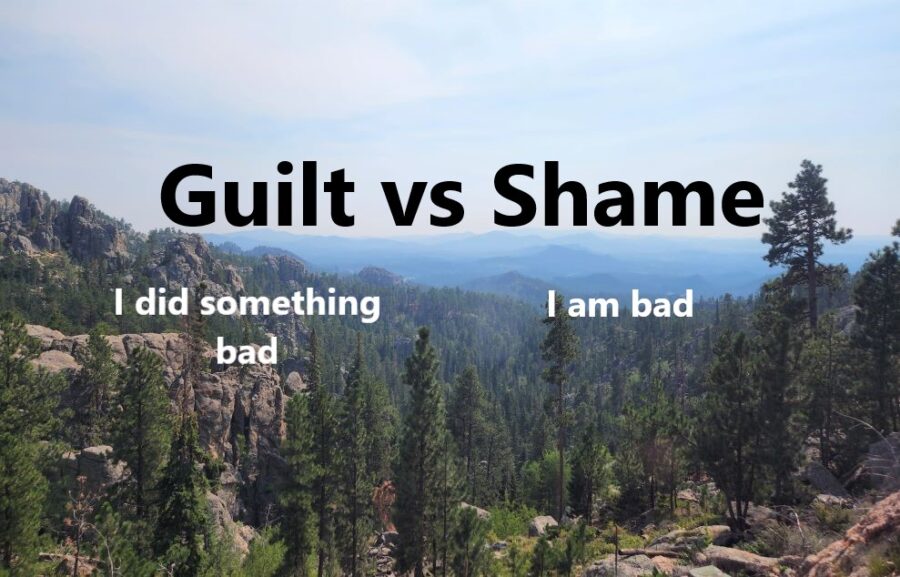In everyday communication, the words guilt and shame are frequently used interchangeably. Do they really mean the same thing? No.
“I am a terrible person.” “I can’t do anything right.” “How could anyone love me?” Are these statements examples of guilt or shame?
“I made a mistake.” “I should have listened to my significant other.” “I was wrong.” Are these statements examples of guilt or shame?
Do these six statements sound different to you? They should. The first group is about shame. They all reflect your self-perception, how you see yourself in the world. You are a bad person, you can’t do anything right. All of the statements have to do with perception. There is nothing in these statements about what you did, only about how you feel about yourself.
The second group of statements focus on your behavior. What you did. “I made a mistake.” “I was wrong.” There is nothing in these statements about self-reflection.
Definition of Guilt
Guilt is an emotion. It involves feeling or perceiving that you did something ”wrong”, that you did something that was hurtful to someone else. When you feel guilty, you feel remorse for something you did. You feel responsible for hurting someone else (intentionally or unintentionally).
Guilt is related to a specific behavior or event. You cheated on your partner. You lied to your boss. You cheated on an exam. You called someone a sexually derogatory name. Your response to your bad behavior is to feel guilty.
When you feel guilty about the “wrong” thing you did, you can:
- recognize your behavior is harmful
- take responsibility for your actions
- make amends
- put it behind you
Definition of Shame
Shame is also an emotion. Shame is not associated with a behavior or event but rather a pervasive negative sense of self. Shame focuses on you, the individual, not your behavior. Shame is a perception of your perceived deficiencies. When you feel shame, the perception or opinion of other people matters more to you than your own!
When you feel shame, you are convinced that you, the core of who you are, is “wrong”. There is something “wrong” with you. You are ashamed of yourself. The result is that you start to hide parts of yourself, the parts you feel are deficient. You become an imposter. See my blog: What is The Imposter Syndrome?
When you feel shame about who you are, you:
- struggle to recognize your shame
- feel hopeless for the future
- feel helpless when it comes to knowing how to make life better
- fixate on your “failures”
Guilt and Shame
To make the distinction between guilt and shame even more difficult, guilt and shame can sometimes occur at the same time!
Example:
Justin and Ashley have recently separated after 7 years of marriage. While they are still in a phase of “trying to work it out”, Justin starts spending time and emotional energy with a co-worker, Monica.
Justin may feel if he was a better husband and father (shame), his relationship with Ashley could be successful. He is aware spending time and emotional energy on Monica is not going to rebuild his relationship with Ashley (guilt).
Ashley feels that if she could juggle being a better wife, mother and employee (shame), Justin wouldn’t have moved out. She feels guilty because she has been spending more time at work lately.
Why Does it Matter?
Understanding the difference between guilt and shame is important. When you feel guilty, you recognize your behavior has been hurtful to someone else. You understand how your behavior could have been harmful. You can then take responsibility for your behavior. By making amends, you may say, “I am sorry” or “I was wrong.” You can then make a plan to do things differently.
Only when you have recognized your behavior, taken responsibility and then made amends can you put your behavior in the past. This sounds simplistic. Sometimes it is an easy process and sometimes it takes a significant amount of self-awareness and effort.
Example:
Owen and Isabella were married for 3 years when Isabella had an affair with a co-worker. Almost immediately she felt guilty (recognized her behavior was harmful). She knew her behavior was wrong. She went to Owen and told him what she had done (she took responsibility for her actions). Isabella apologized to Owen and immediately broke off the affair (made amends). It took a lot of talking, crying and negotiation, but eventually Owen forgave Isabella. Ultimately their relationship became stronger for the challenge they faced early in their relationship.
Example:
Cole and Zoey were married for 3 years when Zoey had an affair with a co-worker. Zoey had struggled with low self-esteem and lack of confidence her whole life. She couldn’t believe that someone like Cole could ever love her. Even Zoey would admit Cole had never done anything or said anything that had made her seek attention from someone else. Zoey felt empty and hollow. Her affair was about filling a void. For Zoey, the future seemed hopeless. She chose the one method of boosting her self-esteem (attention from someone besides her husband) that would be sure to reinforce her negative self-image!
In the first example, the focus was on Isabella’s behavior and her guilt. By focusing on Isabella’s bad behavior they could work on coming to a mutually agreeable resolution. And put it behind them.
In the second example, the focus was on Zoey’s shame. She felt unable to confess to Cole. When he found out about the affair, he was devastated. Cole would ask her why she did it. Zoey would say she didn’t know. She would say she was sorry but couldn’t guarantee it wouldn’t happen again. After all, she didn’t know why she had the affair to begin with!
For Zoey to improve her self-esteem, self-image and confidence, she would need to do a lot of work on herself. Therapy could even be an option.
Take Away Point
People frequently interchange the words guilt and shame. While they can occur simultaneously, they are very different. Accurately describing which you are feeling is important in managing your emotions and obtaining support if you need it.
With warmest regards,
Thank you so much for reading this blog. If you enjoyed the content, please check out other blogs at:
www.relationshipsrelearned.com
www.rvingnomads.com
To be notified of new posts, please enter your email address and click on the Subscribe button.











